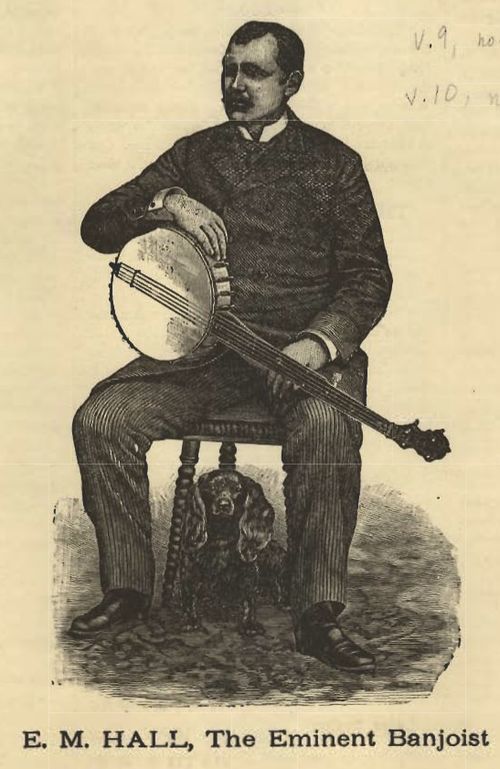Annotation:E.M. Hall's Reel (1)
X:1 T:E.M. Hall’s Reel [1] M:2/4 L:1/8 R:Reel B:Coes Album of Jigs and Reels, something new, for professional and amateur violinists, B:leaders of orchestras, quadrille bands, and clog, reel and jig dancers; consisting of a B:Grand Collection of entirely New and Original Clog-Hornpipes, Reels, jigs, B:Scotch Reels, Irish Reels and Jigs, Waltzes, Walk-Arounds, etc. (1876, p. 12) N:Coes performed with the San Francisco Minstrels in California from 1852 to 1859. Z:AK/Fiddler’s Companion K:D A,/D^C/ D/E/F/G/|A/d/B/d/ A/F/E/D/|F/B,B,/ B/C/D/E/|F/A/G/E/ D/C/B/A,/| A,/D^C/ D/E/F/G/|A/d/B/d/ A/F/E/D/|F/B,/B,/ B,/C/D/E/|F/A/G/E/ Dz:| |:B,/B/{c}B/A/ Bz/A/|c/d/e/c/ d/c/B/A/|A,/A/A/G/ Az/B/|c/d/e/c/ d/c/B/A/| B,/B/{c}B/A/ Bz/A/|c/d/e/c/ dd/B/|A/F/D/F/ AB/A/|G/A/B/c/ d/B/A/F/:|]

Hall lost his life along with 600 other people when the Iroquois Theatre in Chicago burned down on 30th December 1903.
This anecdote, which mentions a Hall performance disrupted by "exuberance" from the audience, ran in the Detroit Tribune in 1888:
Two men and a woman visited Gorman’s Minstrels at Detroit last week, entering the theatre when the programme was about half over. The trio was very flashily dressed. The older man wore a sealskin coat and the other a magnificent Inverness. They stood up and removed them with great ostentation. Finally they became settled down and stared through big opera glasses at the performance.
The persistence with which they levelled their glasses at the stage excited comment. The glasses were almost as large as those used for field purposes. The woman, with an insipid smile, sat idly sucking the handle of her lorgnette. The elder man became uneasy. He began talking in a monotone and applauded uproariously every situation on the stage. Finally he joined in with E.M. Hall on a banjo solo. The younger man tried to suppress his companion’s exuberance, with partial success. Then the woman commenced to whistle. The party were undeniably intoxicated. Manager Wright finally silenced their hilariousness by threatening to remove them.
“I was afraid of those people the moment they entered,” he said.
“Why so?”
“Well, you can tell by their opera glasses that they meant trouble. Those are the latest fad. No more going out between acts. You see, there are three cylinders. The centre one and the outer part of the two others are false. Four whiskey glasses of liquor can be placed in this glass. A little tin tube extends into the centre cylinder. When drawn partly out it opens the valve at its inner end. As many persons hold an opera glass with both hands the deception in perfect, and the contents of the cylinder can be drunk to the last drop. An inventive genius in Washington got up the idea only this fall, and he is making a good thing out of it, 'although lorgnette handles that will hold liquor or perfume are by no means a new thing.”

